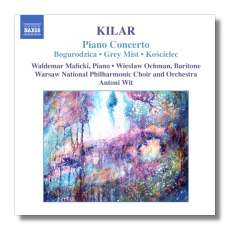
The Internet's Premier Classical Music Source
Related Links
- Latest Reviews
- More Reviews
-
By Composer
-
Collections
DVD & Blu-ray
Books
Concert Reviews
Articles/Interviews
Software
Audio
Search Amazon
Recommended Links
Site News
 CD Review
CD Review
Wojciech Kilar

- Bogurodzica
- Piano Concerto 1
- Siwa Mgła 2
- Koscielec 1909
1 Waldemar Malicki, piano
2 Wiesław Ochman, baritone
Warsaw National Philharmonic Choir and Orchestra/Antoni Wit
Naxos 8.557813 DDD 68:46
Like his contemporaries and countrymen Górecki and Penderecki, Polish composer Wojciech Kilar (b. 1932) has not stood still during his career as a composer. All three composers participated in the musical experimentation of the 1950s and 1960s and created ear-stretching music that has stood the test of time. Nevertheless, their styles softened in the 1970s, and it is for their later music that they have earned most of their fame. For Górecki, his breakthrough work was his Third Symphony, the so-called "Symphony of Sorrowful Songs." Kilar, on the other hand, took a slightly different path, and entered the general public's ear through his film scores. He composed over a hundred of them in Poland, but later received international exposure through his music for Bram Stoker's Dracula (dir. Francis Ford Coppola) and Portrait of a Lady (dir. Jane Campion), among others. (Many classical composers living behind the Iron Curtain earned their daily bread by composing film scores. Alfred Schnittke, Lepo Sumera, and of course Dmitri Shostakovich readily come to mind.)
This new CD contains four important works by Kilar. Koscielec 1909 comes from 1976, and Bogurodzica ("Mother of God") and Siwa Mgła ("Grey Mist") both come from 1979, while the Piano Concerto is a relatively new work, completed in 1997.
It is the 25-minute Piano Concerto that will grab you first, I predict. In it, Kilar clearly has absorbed and digested the influence of Górecki and his Third Symphony. The first movement is dominated by a repetitive, music-box-like figure in the piano, over which the strings sing a sad, long-limbed melody. This will be no surprise to those who have heard his Dracula score. The middle movement is in the style of chorale, which becomes more and more intense as it progresses. Then, without a pause, Kilar has the concerto race to the finish line with a driving Toccata movement. Just as it threatens to take on horrific qualities, Kilar pulls the rug out from under it, suddenly bringing the work to an end with one of music's hoariest musical clichés. Interesting.
Every good Pole knows the Bogurodzica, a traditional hymn to the Virgin Mary, and the country's first national anthem. Kilar has created a fantasy for chorus and orchestra from the ancient tune. Anguished passages alternate with passages of unearthly calm. In this work, perhaps Kilar is reflecting on Poland's difficult, often bloody history, and yet extending his hands to the Virgin Mary for peace and guidance. (One shouldn't forget that Poland was under Communist rule in 1979, although cracks were beginning to show.) Siwa Mgła is a setting for baritone and orchestra of a folk text from the Podhale region. In it, the singer laments that the fog has hidden the path that leads to his sweetheart. Static yet irregularly pulsing divided strings at the beginning vividly portray the thick, almost impenetrable barrier that frustrates the singer. Later, the mood becomes more portentous, and then resolute. Throughout, the vocal line never strays far from this work's folk origins. Koscielec 1909 is a tribute to Polish composer Mieczysław Karlowicz, who died on the eponymous mountain in a skiing accident. Again, the work starts with Góreckian rumblings in the low strings, but the way in which Kilar builds up tension and textures also suggests Ravel, albeit in slow motion! This is not program music, but it does convincingly comment on the death (and transfiguration!) at an early age of one of modern Polish music's first heroes.
All but Siwa Mgła were recorded as part of Kilar's 70th birthday concerts in Warsaw. Wit probably is the most important Polish conductor active today, and his recordings with the Warsaw National Philharmonic seldom disappoint. This one is no exception. The "baritone" in Siwa Mgła is Wiesław Ochman, better known as a tenor (!), who was 65 at the time. Fortunately, Kilar's writing doesn't strain him, and it's nice to hear this veteran again.
The engineering is fine. There are no texts and translations, but Naxos invites you to download them from the internet "to help keep our releases at an affordable price and maintain Naxos' position as leader in the budget-priced market." Sounds good to me!
Copyright © 2006, Raymond Tuttle




















